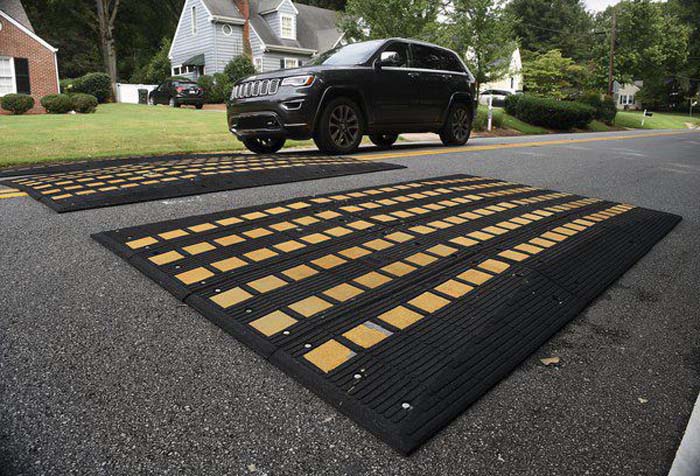Dalton to expand ‘speed cushions’ on residential streets when citizens request them
Published 2:28 pm Friday, August 24, 2018

- Matt Hamilton/Daily Citizen-NewsThe "speed cushions" installed by the city of Dalton are made of recycled rubber, not asphalt like speed bumps. Officials say they slow traffic with less danger of damaging vehicles.
DALTON, Ga. — “Speed cushions” can “calm” traffic, says Dalton Public Works Assistant Director Andrew Parker. But he says they aren’t as “abrasive” as speed bumps.
“The speed cushions that we install are made from recycled rubber, so they are not as abrasive as an asphalt speed bump. But they are still very effective in ensuring that drivers travel at the appropriate speed,” Parker said.
City officials have long resisted residents’ requests to install speed bumps because they slow down emergency vehicles and can damage vehicles that drive over them too fast. Parker said speed cushions don’t create those concerns.
Parker said the speed cushions are designed to be driven over at speeds of up to 25 mph but the recommended maximum speed is 15 mph. He said the cost of the speed cushions is about $4,500 per location.
Dalton Public Works Assistant Director Andrew Parker talks about “speed cushions”
Earlier this year, the Public Works Department started pilot projects, placing speed cushions on Stoneleigh Road and on Valley Drive, two streets where residents have long complained about the speed and volume of traffic.
Residents contacted by the Daily Citizen-News gave the speed cushions mixed reviews.
Naomi Swanson, who lives near Valley Drive, said she and her husband Larry are “extremely pleased with the effect the speed cushions have made on the once unsafe Valley Drive.” She said they have seen a noticeable increase in the number of joggers and walkers on the street, which has no sidewalks.
But Marvin Lewis, who also lives in the area, said he has seen little change.
“Cars brake suddenly at the (speed cushions), then speed up again. They still drive too fast,” he said.
Parker said the city has monitored the speeds along those roads and found that the typical speed has fallen.
The city’s Public Works Committee has created standards for expanding the project to other residential streets. Among other requirements, the criteria say such devices may be installed on pass-through, or connector, streets without sidewalks in residential neighborhoods if 75 percent of homeowners on the street sign off on the request.
“The plan moving forward is to wait until residents request that we evaluate their street,” Parker said. “We have a process identified, and the police department is also involved.”
He said after the Public Works Department completes its evaluation it will present its finding to the Public Works Committee, which will decide whether to install speed cushions on any street. The members of the Public Works Committee are City Administrator Jason Parker, Public Works Director Benny Dunn and City Council members Gary Crews and Annalee Harlan.




